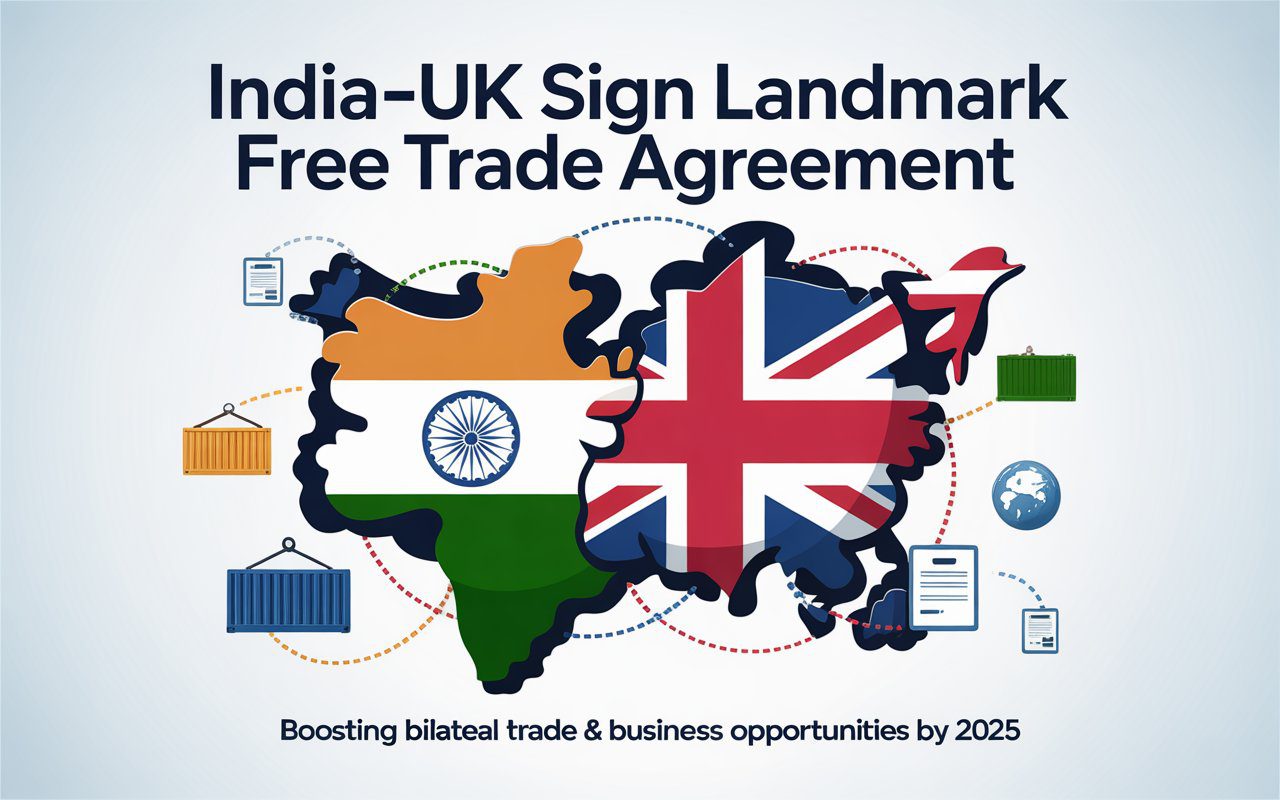- About us
- Outsourcing
- Strategic Finance
- Compliance & Tax
- Automation
- Group Companies
- Resources
- Career

Date: July 25, 2025
The long-anticipated India-UK Free Trade Agreement (FTA) has officially been signed, marking a defining milestone in the economic partnership between the two nations. After years of negotiations, the historic deal is expected to significantly reshape bilateral trade, opening up new opportunities for businesses, exporters, and investors on both sides.
The agreement, hailed as one of India’s most ambitious international trade pacts, is projected to nearly double bilateral trade to over $120 billion by 2030, with further growth potential in strategic sectors such as technology, pharmaceuticals, automobiles, and food processing.
One of the most transformative outcomes of the FTA is the removal of import duties on approximately 99% of Indian goods exported to the UK. Indian manufacturers and MSMEs across textiles, leather goods, gems and jewellery, processed foods, and pharmaceuticals will benefit from improved price competitiveness in UK markets. This move is expected to particularly boost exports from states like Gujarat, Maharashtra, and Tamil Nadu—already strong contributors to India’s global trade volume.
The agreement brings substantial advantages for Indian enterprises looking to expand their global footprint. With tariff reductions, simpler customs procedures, and streamlined logistics protocols, exporters can expect faster delivery cycles and enhanced profitability. Businesses in automotive components, agri-food, and consumer goods will see substantial gains in both volume and market access.
Additionally, the pact includes improved mobility provisions for Indian professionals, including chefs, financial service providers, and creative workers. This is expected to increase business travel and short-term work access in the UK, further strengthening B2B partnerships and cultural ties.
For the UK, this FTA opens doors to the Indian market for luxury cars, alcoholic beverages, and high-end machinery, with duties being gradually phased out over a decade. British automotive brands such as Jaguar and Land Rover, for instance, will benefit from tariff reductions, while India maintains calibrated protection for sensitive sectors.
Furthermore, the agreement emphasizes regulatory cooperation, digital trade, and IP protection, creating a more predictable framework for foreign investment and technology collaboration.
From a geopolitical perspective, this deal holds considerable significance. It is the UK’s first major bilateral agreement post-Brexit with a fast-growing economy and underscores its ‘Global Britain’ agenda. Meanwhile, for India, the agreement aligns with its vision to forge strong trade partnerships beyond traditional allies and boost manufacturing under the Make in India initiative.
Textiles and Apparel: Tariff elimination to accelerate export volumes, especially from India’s MSME clusters.
Pharma and Healthcare: Easier regulatory clearances and IP recognition to encourage growth in generics and formulations.
Food Processing & Agriculture: Greater access for Indian agri-products, dairy alternatives, and packaged food.
Technology & Digital Trade: Stronger safeguards and recognition of digital certification to foster tech partnerships.
While the deal presents vast opportunities, it also introduces challenges for Indian businesses. Increased competition in sectors like spirits, dairy, and automotive requires firms to enhance product quality and service agility. There are also concerns around expanded IP protections and their potential effect on access to affordable medicines.
However, the government has reassured that safeguards are in place for vulnerable industries and that transition timelines will allow domestic players to adapt smoothly.
The India–UK Free Trade Agreement is more than a trade pact it’s a gateway to long-term collaboration, economic diplomacy, and mutual prosperity. For Indian businesses, this is the time to evaluate global readiness, explore export avenues, and seize the momentum created by this historic deal.
Subscribe to our newsletter and stay updated.